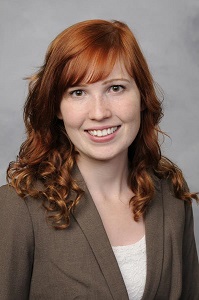Member Spotlight: Megan Parilla
 1. What is your name?
1. What is your name?
Megan Parilla, MD
2. What is your professional title?
Hematopathology Fellow, the University of Chicago Medical Center
3. How did you decide to enter the field/What (or who) brought you into the field?
As a teenager my parents took me to Cystic Fibrosis fundraisers. At one fundraising 5K run, I saw a booth advertising the medical advances made in the understanding and treatment of CF over 50 years. At that moment I decided I wanted to do medical research. After additional soul-searching, I realized that I also wanted to make an impact in the day-to-day care of patients, and pathology seemed like a great fit.
4. What do you do? How would you describe your role?
In my current position I am a trainee involved in the diagnosis of leukemia, lymphoma, and benign hematologic diseases. In addition, I am involved in numerous research projects to identify underlying genetic alterations that give rise to both hematopoietic malignancy as well as “solid” tumors.
5. How does your work help patients?
Our daily diagnostic work assists clinicians in naming, treating, and monitoring patients’ hematologic disease. Our research will hopefully assist in understanding disease and lead to better, less toxic treatments for patients in the near future.
6. What degree(s) and/or training did you receive to achieve your position?
I received a bachelor’s degree in molecular and cellular biology, followed by a medical degree. I then pursued training in anatomic and clinical pathology at the University of Chicago, with further specialization in hematopathology.
7. What is the greatest challenge you face in your work?
The greatest challenge has been simply being a trainee. Pathology is a remarkably complex and broad field; becoming an independent, capable, and appropriately confident pathologist is arduous.
8. What is the best part of your work as you see it? (most interesting, fun…)
The most exciting part of my research is discovery. Recently we were the first group to find that a rare tumor, called eosinophilic solid and cystic renal cell carcinoma (ESC RCC), is driven by somatic mutations in TSC1 and TSC2 genes.
9. What AMP resources/courses have helped you advance your career?
The AMP webcasts are an amazing resource for those still training. They simplify concepts that are difficult to grasp and assist in staying up-to-date in a quickly evolving field.
10. In your opinion, what are the most valuable aspects of AMP membership?
I value my current connections with some AMP members, people I consider leaders in the field, and appreciate the potential to broaden connections by meeting other remarkable members.
11. Anything else we should know?
I am thrilled to be starting my next fellowship in molecular pathology at Memorial Sloan Kettering Cancer Center this summer.

















